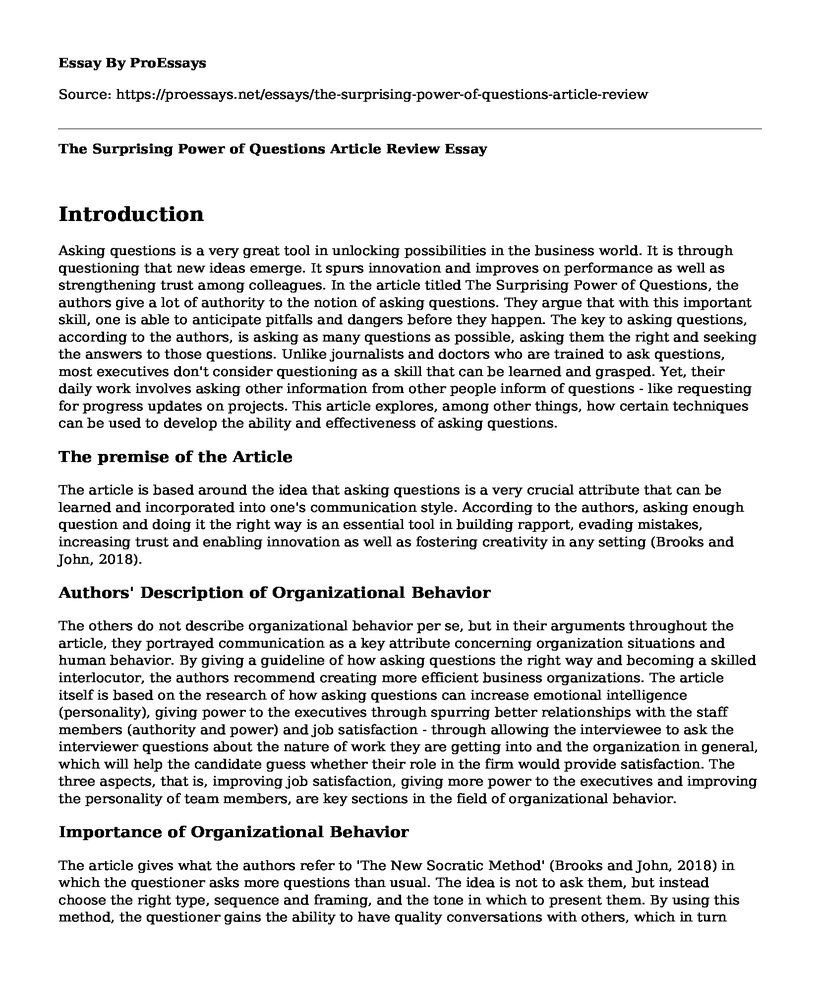Introduction
Asking questions is a very great tool in unlocking possibilities in the business world. It is through questioning that new ideas emerge. It spurs innovation and improves on performance as well as strengthening trust among colleagues. In the article titled The Surprising Power of Questions, the authors give a lot of authority to the notion of asking questions. They argue that with this important skill, one is able to anticipate pitfalls and dangers before they happen. The key to asking questions, according to the authors, is asking as many questions as possible, asking them the right and seeking the answers to those questions. Unlike journalists and doctors who are trained to ask questions, most executives don't consider questioning as a skill that can be learned and grasped. Yet, their daily work involves asking other information from other people inform of questions - like requesting for progress updates on projects. This article explores, among other things, how certain techniques can be used to develop the ability and effectiveness of asking questions.
The premise of the Article
The article is based around the idea that asking questions is a very crucial attribute that can be learned and incorporated into one's communication style. According to the authors, asking enough question and doing it the right way is an essential tool in building rapport, evading mistakes, increasing trust and enabling innovation as well as fostering creativity in any setting (Brooks and John, 2018).
Authors' Description of Organizational Behavior
The others do not describe organizational behavior per se, but in their arguments throughout the article, they portrayed communication as a key attribute concerning organization situations and human behavior. By giving a guideline of how asking questions the right way and becoming a skilled interlocutor, the authors recommend creating more efficient business organizations. The article itself is based on the research of how asking questions can increase emotional intelligence (personality), giving power to the executives through spurring better relationships with the staff members (authority and power) and job satisfaction - through allowing the interviewee to ask the interviewer questions about the nature of work they are getting into and the organization in general, which will help the candidate guess whether their role in the firm would provide satisfaction. The three aspects, that is, improving job satisfaction, giving more power to the executives and improving the personality of team members, are key sections in the field of organizational behavior.
Importance of Organizational Behavior
The article gives what the authors refer to 'The New Socratic Method' (Brooks and John, 2018) in which the questioner asks more questions than usual. The idea is not to ask them, but instead choose the right type, sequence and framing, and the tone in which to present them. By using this method, the questioner gains the ability to have quality conversations with others, which in turn builds relationships that help in achieving organizational, social and human objectives.
Business Concepts in the Article
One of the central business concepts present in the article is being a good negotiator. On the word of authors, possessing good negotiation skills would put an executive to have more productive conversations necessary to unlocking value in organizations. If one is better at using the power of questioning to win negotiations than that their competitors, their organization will be poised to deliver new or existing products to the market than everyone else. This approach would have added unique value to the business.
References
Brooks, A. W., & John, L. K. (2018). The Surprising Power of Questions. HARVARD BUSINESS REVIEW, 96(3), 60-67.
Cite this page
The Surprising Power of Questions Article Review. (2022, Aug 08). Retrieved from https://proessays.net/essays/the-surprising-power-of-questions-article-review
If you are the original author of this essay and no longer wish to have it published on the ProEssays website, please click below to request its removal:
- Same-Sex Marriage
- Management of Organizational Behavior Essay Example
- Essay Sample on Communication Accommodation Theory: Adapting to Fit In
- Essay on Poor Planning of Community Health Assessment: Devastating Impact
- Essay Example on Leadership Skills: The Key to Business Performance
- Essay Sample on Chicano Movement: Mexican Americans' Fight for Empowerment
- Case Study Sample on Ethical Decision-Making: Models to Guide Critical Thinking







